US home prices closed out 2012 with the biggest annual gain in more than six years while sales of new homes spiked in January, the latest sign that the long-suffering housing market was on the mend, data showed yesterday.
American consumers, meanwhile, grew more optimistic in February as the prior month’s worries about a broad tax increase faded.
“The numbers are all pretty strong. It’s a significant rise in confidence and a strong rise in new homes sales — there is not really much to argue in those numbers,” said David Sloan, an economist at 4Cast Ltd in New York.
The S&P/Case Shiller composite index of 20 metropolitan areas showed home prices jumped 6.8% in the year to December, the best year-on-year gain since July, 2006, just before the bottom began to fall out of the US housing market.
The index gained 0.9% in December on a seasonally adjusted basis, topping economists’ expectations of 0.5%.
Separately, Commerce Department data showed sales of new homes jumped 15.6% to a 4-1/2-year high. The percentage increase was the largest in almost 20 years.
Omer Esiner, chief market analyst at Commonwealth Foreign Exchange in Washington, called it “a blowout number.”
Consumer confidence rose more than expected this month as Americans shrugged off worries about fiscal policy.
But while the full brunt of tax increases and spending cuts that were scheduled to go into effect in 2013 was averted, taxes did rise for some Americans and the payroll deduction holiday came to an end, leaving consumers with less spending money.
Major US stock indexes rallied while Treasury yields rose after the stronger-than-expected data.
Data from the Federal Deposit Insurance Corp showing the US banking industry recorded its highest earnings last year since before the financial crisis also contributed to the rosier economic outlook.
Improvements in housing helped lift fourth-quarter profits at Home Depot. The world’s largest home improvement chain also forecast higher sales and earnings per share for the current fiscal year.
Last year, housing contributed to economic growth for the first time since 2005. Prices have been rising since last February, as the supply of available homes for sale tightened in 2012.
Investors buying cheap homes to be converted into rentals also supported the market and some struggling areas saw a sharp bounce back in prices.
But the market is far from fully healed. Some 20% of mortgages are underwater and foreclosure rates remain elevated.
“Housing won’t be a huge contributor to growth this year but we are on the long road to recovery,” said Michael Hanson, senior US economist at Bank of America Merrill Lynch. “But consumers will need to see that these gains are persistent.”
Home-buyers also have been enticed by the historically low interest rates. The Federal Reserve’s latest stimulus efforts are helping to keep rates low, as the central bank buys assets including mortgage-backed securities.
Fed Chairman Ben Bernanke strongly defended that policy yesterday. The Fed’s rate setting-committee has said it intends to keep buying $85bn of mortgage-backed and government debt each month until the labour market improves substantially.
Minutes from the central bank’s last policy meeting revealed last week that some officials thought the Fed might have to taper off its purchases before seeing the increase in hiring that the programme is designed to deliver.
Some economists expect rising home prices and recent stock market gains to blunt the impact of tax increases for consumers, which should help spending improve in the second half of 2013.
Macy’s, which also operates the Bloomingdale’s chain of luxury stores, said yesterday it expected same-store sales to rise about 3.5% this year.
But risks remain. Government spending cuts worth about $85bn are due to take effect at the end of the week unless Washington agrees to postpone them.
A high jobless rate was also likely to drag on spending, economists said, while it would take time for an improved housing market to translate into much stronger spending and easier consumer lending.
“There’s a mix of good news and bad news in the economy, and housing is on the good side of the ledger. But people can’t slice off a piece of their house and take it to the store, they still need to borrow,” said Hanson. “And concern about fiscal issues will keep consumer sentiment volatile.”

